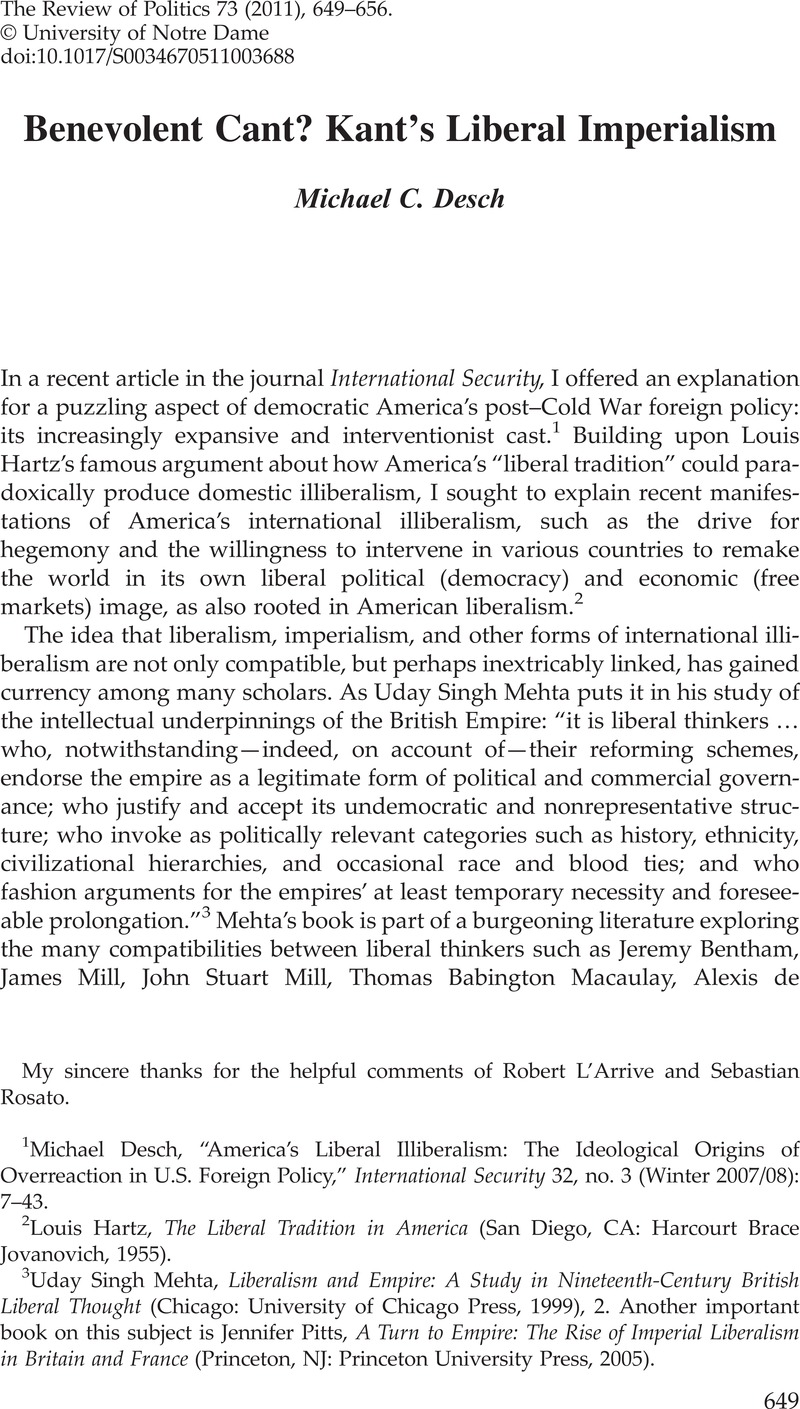Published online by Cambridge University Press: 26 October 2011

1 Desch, Michael, “America's Liberal Illiberalism: The Ideological Origins of Overreaction in U.S. Foreign Policy,” International Security 32, no. 3 (Winter 2007/08): 7–43CrossRefGoogle Scholar.
2 Hartz, Louis, The Liberal Tradition in America (San Diego, CA: Harcourt Brace Jovanovich, 1955)Google Scholar.
3 Mehta, Uday Singh, Liberalism and Empire: A Study in Nineteenth-Century British Liberal Thought (Chicago: University of Chicago Press, 1999)Google Scholar, 2. Another important book on this subject is Pitts, Jennifer, A Turn to Empire: The Rise of Imperial Liberalism in Britain and France (Princeton, NJ: Princeton University Press, 2005)CrossRefGoogle Scholar.
4 Hume, David, “Of the Balance of Power,” in Essays: Moral, Political and Literary, ed. Green, T. H. and Rose, T. H. (Indianapolis, IN: Liberty Fund, 1987), 354Google Scholar. This is also discussed in Doyle, Michael W., Ways of War and Peace (New York: W. W. Norton, 1997), 265n.26Google Scholar.
5 Another difference was my focus on the role of American hegemony since the end of the Cold War in allowing the United States to pursue Wilsonianism on steroids. See Desch, “America's Liberal Illiberalism,” 8–9.
6 Hartz, Liberal Tradition, 3–32.
7 The influence of Kant on how we think about and understand modern international relations is ubiquitous. Most obviously, Kant is the progenitor of contemporary “democratic peace theory,” which Jack Levy calls “as close as anything we have to an empirical law in international relations.” See his “Domestic Politics and War,” in The Origin and Prevention of Major Wars, ed. Rotberg, Robert I. and Rabb, Theodore K. (Cambridge: Cambridge University Press, 1988), 88Google Scholar. More surprisingly, Kant's influence on modern neorealism is also profound. Compare Waltz, Kenneth N., “Kant, Liberalism, and War,” American Political Science Review 56, no. 2 (1962): 331–40CrossRefGoogle Scholar with his Theory of International Politics (Reading, MA: Addison-Wesley, 1979)Google Scholar.
8 Hobbes, Thomas, Leviathan, chap. 12, in Great Books of the Western World, ed. Hutchins, Robert Maynard (Chicago: Encyclopedia Britannica Inc., 1952), 23:85–86Google Scholar.
9 Pangle, Thomas L. and Ahrensdorf, Peter J., Justice Among Nations: On the Moral Basis of Power and Peace (Lawrence: University Press of Kansas, 1999), 198–99Google Scholar.
10 Kant, Immanuel, The Philosophy of Law: An Exposition of the Fundamental Principles of Jurisprudence as the Science of Right (henceforward POL), trans. Hastie, W. (Edinburgh: Clark, 1887), 76Google Scholar, available at http://oll.libertyfund.org/index.php?option=com_staticxt&staticfile=show.php%3Ftitle=359&layout=html.
11 Kant, Immanuel, Perpetual Peace (henceforward PP), in Perpetual Peace and Other Essays on Politics, History, and Morals, ed. Humphrey, Ted (Indianapolis: Hackett, 1983), 115Google Scholar.
12 Kant, PP, 112n.
13 For further discussion of Kant's point see Pippin, Robert B., “Mine and Thine? The Kantian State,” in The Cambridge Companion to Kant and Modern Philosophy, ed. Guyer, Paul (Cambridge: Cambridge University Press, 2006), 417Google Scholar; and Shell, Susan Meld, “Kant on Just War and ‘Unjust Enemies’: Reflections on a ‘Pleonasm,’” Kantian Review 10 (January 2005): 82–111CrossRefGoogle Scholar.
14 Kant, POL, 78.
15 Friedrich, Carl Joachim, Inevitable Peace (New York: Greenwood, 1969), 34Google Scholar.
16 Pangle and Ahrensdorf, Justice Among Nations, 198.
17 Hassner, Pierre, “Immanuel Kant,” in History of Political Philosophy, ed. Strauss, Leo and Cropsey, Joseph, 2nd ed. (Chicago: University of Chicago Press, 1972), 568Google Scholar.
18 Kant, PP, 115–18.
19 Pangle and Ahrensdorf, Justice Among Nations, 199, highlight the problem of the incompatibility between them. Kant himself raises an even deeper hermeneutical challenge with his “Secret Article for Perpetual Peace” which argues that statesmen cannot openly seek the advice of philosophers but must do so “secretly,” leading careful readers to look past surface inconsistencies for a deeper message (PP, 125–26).
20 Even a narrow reading of Perpetual Peace shows that Kant did not categorically eschew intervention. See his qualification of the Fifth Preliminary Article in the context of internal anarchy at PP, 109. This could constitute a Kantian liberal basis for intervention in Libya, to take a recent example.
21 Kant, POL, sec. 56.
22 Pitts, 15.
23 Quoted in Pangle and Ahrensdorf, Justice Among Nations, 193. Also see the discussion Hassner, “Immanuel Kant,” 563–64.
24 Kant, PP, 124–25. For Waltz's development of this argument see his “Kant, Liberalism, and War,” 336–38.
25 Friedrich, Inevitable Peace, 219–21.
26 “President Woodrow Wilson's War Message,” 2 April 1917, available at http://wwi.lib.byu.edu/index.php/Wilson's_War_Message_to_Congress.
27 “President Discusses Progress in Iraq,” Washington, DC, 23 July 2003, available at http://georgewbush-whitehouse.archives.gov/news/releases/2003/07/20030723-1.html.